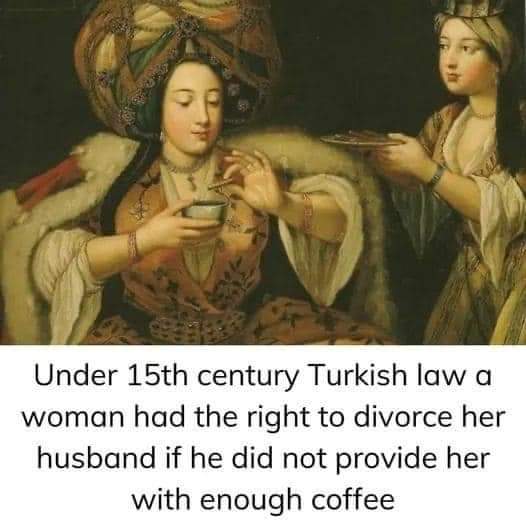
In the 15th century, in the bustling streets of Istanbul, coffee was not just a beverage; it was a way of life. Coffeehouses were the heartbeat of the city, and discussions over a cup of rich, dark brew could make or break a reputation. But little did the men of the time know, the beans that fuelled their conversations would soon lead to an unexpected revolution in Turkish culture: the Great Coffee Divorce.
The story begins with a man named Mehmet, a lovable yet forgetful fellow who had a talent for getting into absurd predicaments. His wife, Ayse, was as sweet as the honey they drizzled over their baklava but had one unshakable passion: coffee. She didn't just enjoy it, she worshipped the aromatic elixir like a goddess.
One fateful morning, Ayse woke up to find that her coffee pot was empty. Panic set in. The sun was barely rising, but her craving for caffeine had already reached epic proportions. Mehmet had forgotten to brew her morning coffee.
"Darling, where is my coffee?" Ayse asked, her voice dripping with faux sweetness.
Mehmet, realising his mistake, went into full-on damage control mode. "Oh, my dearest, I was just about to make it. I promise. It's just that... I had a dream about flying goats last night, and it was so captivating!"
Ayse rolled her eyes. She loved Mehmet, but she loved her coffee more. "Well, you better have a good reason for keeping me from my coffee."
Mehmet, ever the improviser, jumped into action. "Darling, I was trying to create a new coffee blend, a flavour that would take the world by storm! I promise it'll be worth the wait."
Ayse eyed him skeptically. "Fine, but it better be the nectar of the gods."
Mehmet rushed to the market, seeking the finest coffee beans and spices, concocting a brew so incredible it would knock his wife's socks off. But as he blended the beans and spices together, he accidentally spilled half the mixture into the fire, setting off a chain reaction of smoke and chaos. His neighbour, Mustafa, rushed in to help, and they both ended up in a fit of coughing and laughter.
By the time they finally managed to salvage some semblance of coffee, it was mid-morning. Ayse had been waiting for hours, her patience waning with each passing minute.
When Mehmet presented her with the coffee, he held his breath. Ayse took a sip, and her eyes lit up. "This is incredible! It's worth the wait!"
Mehmet breathed a sigh of relief. "You forgive me then?"
Ayse, her mood significantly improved, put down her cup and grinned. "Of course, darling. But remember, in 15th-century Turkish culture, a woman can divorce her husband if he doesn't provide her with enough coffee."
Mehmet chuckled. "Oh, you and your coffee jokes."
Little did they know that this humorous incident would become legend, and tales of "The Coffee Divorce" would spread throughout the land. Coffee, once a simple pleasure, now held an unspoken power. Men across the Ottoman Empire began to treat their wives with newfound respect and, most importantly, a steady supply of coffee.
And so, the Great Coffee Divorce became a humorous myth, reminding husbands for centuries to come that in Turkish culture, a woman's love for coffee was not to be underestimated. As for Ayse and Mehmet, their marriage thrived, fuelled by love, laughter, and the occasional spilled coffee.